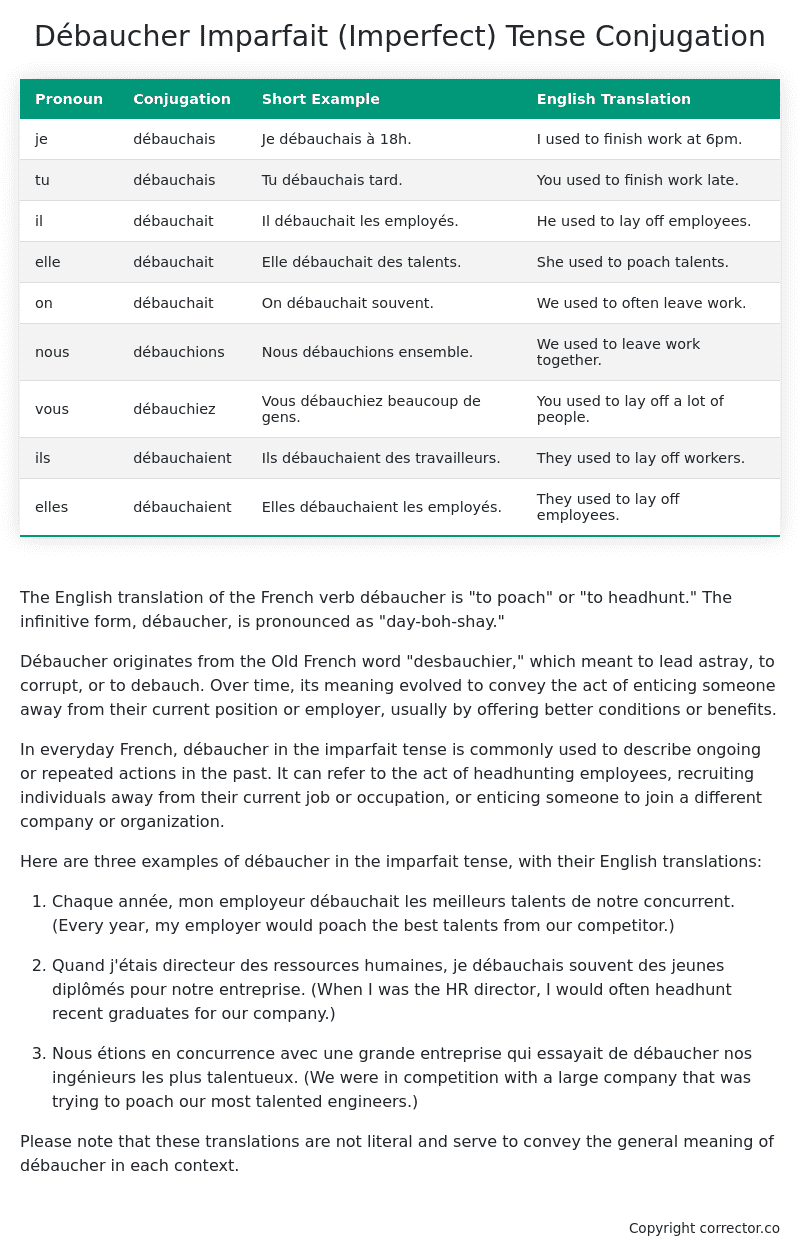Imparfait (Imperfect) Tense Conjugation of the French Verb débaucher
Introduction to the verb débaucher
The English translation of the French verb débaucher is “to poach” or “to headhunt.” The infinitive form, débaucher, is pronounced as “day-boh-shay.”
Débaucher originates from the Old French word “desbauchier,” which meant to lead astray, to corrupt, or to debauch. Over time, its meaning evolved to convey the act of enticing someone away from their current position or employer, usually by offering better conditions or benefits.
In everyday French, débaucher in the imparfait tense is commonly used to describe ongoing or repeated actions in the past. It can refer to the act of headhunting employees, recruiting individuals away from their current job or occupation, or enticing someone to join a different company or organization.
Here are three examples of débaucher in the imparfait tense, with their English translations:
-
Chaque année, mon employeur débauchait les meilleurs talents de notre concurrent.
(Every year, my employer would poach the best talents from our competitor.) -
Quand j’étais directeur des ressources humaines, je débauchais souvent des jeunes diplômés pour notre entreprise.
(When I was the HR director, I would often headhunt recent graduates for our company.) -
Nous étions en concurrence avec une grande entreprise qui essayait de débaucher nos ingénieurs les plus talentueux.
(We were in competition with a large company that was trying to poach our most talented engineers.)
Please note that these translations are not literal and serve to convey the general meaning of débaucher in each context.
Table of the Imparfait (Imperfect) Tense Conjugation of débaucher
| Pronoun | Conjugation | Short Example | English Translation |
|---|---|---|---|
| je | débauchais | Je débauchais à 18h. | I used to finish work at 6pm. |
| tu | débauchais | Tu débauchais tard. | You used to finish work late. |
| il | débauchait | Il débauchait les employés. | He used to lay off employees. |
| elle | débauchait | Elle débauchait des talents. | She used to poach talents. |
| on | débauchait | On débauchait souvent. | We used to often leave work. |
| nous | débauchions | Nous débauchions ensemble. | We used to leave work together. |
| vous | débauchiez | Vous débauchiez beaucoup de gens. | You used to lay off a lot of people. |
| ils | débauchaient | Ils débauchaient des travailleurs. | They used to lay off workers. |
| elles | débauchaient | Elles débauchaient les employés. | They used to lay off employees. |
Other Conjugations for Débaucher.
Le Present (Present Tense) Conjugation of the French Verb débaucher
Imparfait (Imperfect) Tense Conjugation of the French Verb débaucher (You’re reading it right now!)
Passé Simple (Simple Past) Tense Conjugation of the French Verb débaucher
Passé Composé (Present Perfect) Tense Conjugation of the French Verb débaucher
Futur Simple (Simple Future) Tense Conjugation of the French Verb débaucher
Futur Proche (Near Future) Tense Conjugation of the French Verb débaucher
Plus-que-parfait (Pluperfect) Tense Conjugation of the French Verb débaucher
Passé Antérieur (Past Anterior) Tense Conjugation of the French Verb débaucher
Futur Antérieur (Future Anterior) Tense Conjugation of the French Verb débaucher
Subjonctif Présent (Subjunctive Present) Tense Conjugation of the French Verb débaucher
Subjonctif Passé (Subjunctive Past) Tense Conjugation of the French Verb débaucher
Subjonctif Imparfait (Subjunctive Imperfect) Tense Conjugation of the French Verb débaucher
Subjonctif Plus-que-parfait (Subjunctive Pluperfect) Tense Conjugation of the French Verb débaucher
Conditionnel Présent (Conditional Present) Tense Conjugation of the French Verb débaucher
Conditionnel Passé (Conditional Past) Tense Conjugation of the French Verb débaucher
Conditionnel Passé II (Conditional Past II) Tense Conjugation of the French Verb débaucher
L’impératif Présent (Imperative Present) Tense Conjugation of the French Verb débaucher
L’impératif Passé (Imperative Past) Tense Conjugation of the French Verb débaucher
L’infinitif Présent (Infinitive Present) Tense Conjugation of the French Verb débaucher
L’infinitif Passé (Infinitive Past) Tense Conjugation of the French Verb débaucher
Le Participe Présent (Present Participle) Tense Conjugation of the French Verb débaucher
Le Participe Passé (Past Participle) Tense Conjugation of the French Verb débaucher
Struggling with French verbs or the language in general? Why not use our free French Grammar Checker – no registration required!
Get a FREE Download Study Sheet of this Conjugation 🔥
Simply right click the image below, click “save image” and get your free reference for the débaucher imparfait tense conjugation!

Débaucher – About the French Imparfait Tense
NOTE: To take a deep dive into all the French tenses then see our article on Mastering French Tense Conjugation.
Formation of the Imparfait Tense
For regular -er verbs:
For regular -ir verbs
For regular -re verbs
Common Everyday Usage Patterns
Description of Past Habits
Background Information
Mental and Emotional States
It’s employed to express emotions, thoughts, or physical sensations in the past. For example: “J’étais content quand il est arrivé.” (I was happy when he arrived.)
Ongoing Actions
Points to Note About the Imparfait Tense
Passé Composé vs. Imparfait
Conditional
Si Clauses
Narration
I hope you enjoyed this article on the verb débaucher. Still in a learning mood? Check out another TOTALLY random French verb imparfait conjugation!


